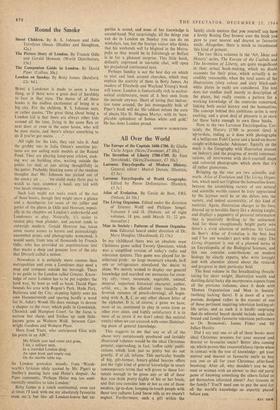All Over the World
The Europe of the Capitals 1600-1700. By Giulio
Carlo Argan. (Skira/Zwemmer, 10s.)
Atlas of Evolution. By Gavin de Beer, FRS. (Nelson, £4 10s.) Man in Society : Patterns of Human Organisa- tion. Editorial board under direction of Dr. Mary Douglas. (Macdonald, £2 15s.) IN my childhood there was an absolute must Christmas game called Twenty Questions, which was a simplified version of today's radio and television quizzes. This game was played for in- tellectual pride: no large monetary awards, hi-fi sets or refrigerators stimulated the desire to shine. We merely wished to display our general knowledge and searched our memories for coun- try, city, river, mountain, vegetable, animal, mineral, important historical character, author, artist, etc., in the allotted time (usually ten feverish minutes of pencil-chewing), all begin- ning with A, B, C or any other chosen letter of the alphabet. It is, of course, a game we have, most of us, continued to play in some form or other ever since, and highly satisfactory it is to most of us (even if we don't admit this natural vanity) when we can astonish with some illuminat- ing piece of general knowledge.
This suggests to me that any or all of the above very sumptuously produced and lavishly illustrated volumes would be the ideal Christmas present, superseding, in fact, 'coffee table' publi- cations which look just as pretty but do not greatly, if at all, inform. This particular bundle of big, gift-format, luxury-gilded heavies offers just the right kind of general knowledge in smart contemporary terms that will prove to those for- tunate enough to be given any or all of these that you think pretty highly of his or her brain, and that you consider him or her as one of those modern, up-to-date, keeping-in-touch people with those two cultures Lord Snow tells us we mustn't neglect. Furthermore, such a gift within the
family circle ensures that you yourself can have a lovely Boxing Day browse over the book you gave to your nearest and dearest or favourite uncle. Altogether, there is much to recommend this kind of present.
The two Skira volumes in the 'Art, Ideas and History' series, The Europe of the Capitals and The Invention of Liberty, are quite magnificent in their actual book-making, which no doubt accounts for their price, which actually is in- credibly reasonable, when the total assets of the illustrations (sixty colour and sixty black-and- white plates in each) are considered. The text does not confine itself merely to description of the plates, but really creates a pattern for a working knowledge of the centuries concerned, linking both social history and the humanities. The concept behind this ambitious series is very exciting, and a great deal of pleasure is in store for those lucky enough to own these books.
Now to the two Larousse Encyclopedias. Cer- tainly the History (1500 to present time) is up-to-date, ending as it does with photographs of a belligerent Fidel Castro and a hand-on-brow- caught-with-headache Adenauer. Equally on the mark is the Geography with illustration stresses on industry and the progress of world communi- cations, all interwoven with do-it-yourself maps and coloured photographs which show that it's all rather glamorous.
Bringing up the rear are two scientific stal- warts, Atlas of Evolution and The Living Organ- ism, which need not frighten the humanities-lover, because the astonishing variety of our natural and scientific worlds cannot be truly appreciated by the layman until he or she delves into the variety, and indeed eccentri6ity, of this kind of material. Again, illustration charges to the fore, dressed up in heraldic finery like a shining knight, and displays a pageantry of pictorial information that is positively thrilling to the unlearned. And for those exceptionally bright party wits there's a vivid selection of embryos. Sir Gavin de Beer's Atlas of Evolutiop is the best buy and I for one wouldn't part with my copy. The Living Organism is one of a planned series in an Encyclopedia of the Biological Sciences, and this one contains contributions on modern biology by clearly experts, Who write lovingly and with abandon almost about the research and progress in their particular field.
The final volume in this breathtaking (breath- taking for sheer weight, illustration wealth and dazzling.data) lucky dip incorporates aspects from all the previous volumes, since it deals with 'Human Organisation and Man in Society' (nothing lacking there). It is more of a sym- posium, designed rather in the manner of one of those pertinent inquiring television looking-at- life series, and as such it is hardly surprising that its editorial board should include such cele- brated and family-favourite television performers as Dr. Bronowski, James Fisher and Sir Julian Huxley.
Did I say any one or all of these books were ideal Christmas presents for your nearest and dearest or favourite uncle? Better idea coming up, which proves that resourcefulness ripens when in contact with the tree of knowledge: get your nearest and dearest or favourite uncle to buy you one or all for your Christmas after-food browsing. After all, why shouldn't you be the man or woman with an answer to that old party game of knowing something the others failed to get themselves informed about? Any tycoons in the family? You'll need one to pay the cost for all the world's knowledge so expertly placed before you.
KAY DICK




























 Previous page
Previous page